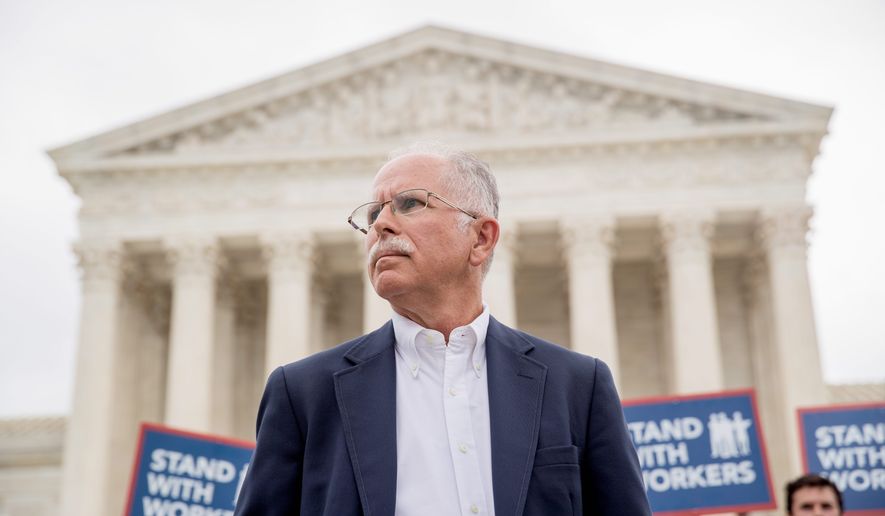Public employees in New Jersey want to put their state on a collision course with the Supreme Court, saying a new law forcing them to pay union dues if they don’t quickly withdraw from the union contradicts a ruling the high court justices issued last year.
At least six employees say they tried to withdraw over the last year, but their unions refused to let them go, saying they didn’t act within the strict 10-day decision window the New Jersey law gives them.
Now those employees are suing, saying the state is being too stringent.
“This was a barrier intentionally made to prop up the unions and limit the effect of Janus. Our goal is to remove that barrier,” said Patrick Wright, an attorney with the Mackinac Center Legal Foundation which is representing four of the employees.
“Janus” refers to Mark Janus, the plaintiff in the case that went to the Supreme Court last year and which, in a 5-4 ruling, the justices said public sector labor unions inherently engage in political speech as they advocate for larger police forces or smaller class sizes.
Overturning a 1970s-era precedent, the court ruled that forcing employees to pay dues or fees to unions who then engage in political activity forces them to subsidize speech with which they may disagree and thus violates the First Amendment.
But a month before the ruling was issued, New Jersey enacted the Workplace Democracy Enhancement Act, which said public employees looking to withdraw from their unions must do so in writing during a 10-day period around the anniversary of their hiring.
A nurse, a transportation department worker, a state college employee and two municipal inspectors, as well as Mike Thulen Jr., former president of the American Federation of State, County and Municipal Employees Local 3790, have all filed or joined lawsuits asking courts to invalidate New Jersey’s law.
“As someone who has personally committed my time and energy to stewarding my local union, I fully believe that unions can play a positive role in the workplace. We are simply asking that our labor leaders spend more time serving their members in that capacity rather than erecting arbitrary barriers meant to hold us hostage,” said Mr. Thulen.
His union and the state both moved to dismiss Mr. Thulen’s lawsuit last month.
New Jersey Attorney General Gurbir Grewal argued the law does not conflict with the Janus ruling. He said the law doesn’t require anyone to remain in a union, but sets reasonable restrictions on how they can declare their intentions.
“No plaintiff here contends that he has been forced to pay anything beyond what he agreed to pay in prior agreements with the applicable union,” Mr. Grewal said in court filings.
The lawsuits have all been assigned to District Judge Renee Marie Bumb, an appointee of President George W. Bush.
Public-sector unions had feared the Janus decision would slash their membership.
Early returns showed AFSCME, at the national level, saw a 6% decline in workers paying fees since the ruling. That single digit decrease means millions of dollars less to fund the union’s activities. It’s too early to see results for other major unions.
Democratic-led states, worried about the effects on one of their most reliable political backers, rushed to try to protect unions in the period surrounding the Janus case.
New York Gov. Andrew Cuomo signed legislation promoting union membership, including alerting unions and providing names and contact information when a new eligible employee is hired for a public sector job.
New Jersey’s law, though, is the only one to set a narrow withdrawal period.
Mitchell Rubinstein, an attorney and professor at New York Law School, said the 10-day window may be too narrow to pass the court’s analysis.
“Because the New Jersey statute goes beyond requiring the state to be neutral in labor matters and is in a sense a pro-labor statute, I believe that courts will closely scrutinize the statute and declare that this limited window period is too much of a burden on the First Amendment and therefore, unconstitutional,” Mr. Rubinstein said.
In addition to the New Jersey challenges, there are about 50 other lawsuits involving workers who say their unions are making it difficult for them to withdraw or who are trying to claw back dues they paid in the past.
Some lawyers are also trying to expand the Janus ruling to apply to mandatory membership in state legal bar associations.
• Alex Swoyer can be reached at aswoyer@washingtontimes.com.




Please read our comment policy before commenting.